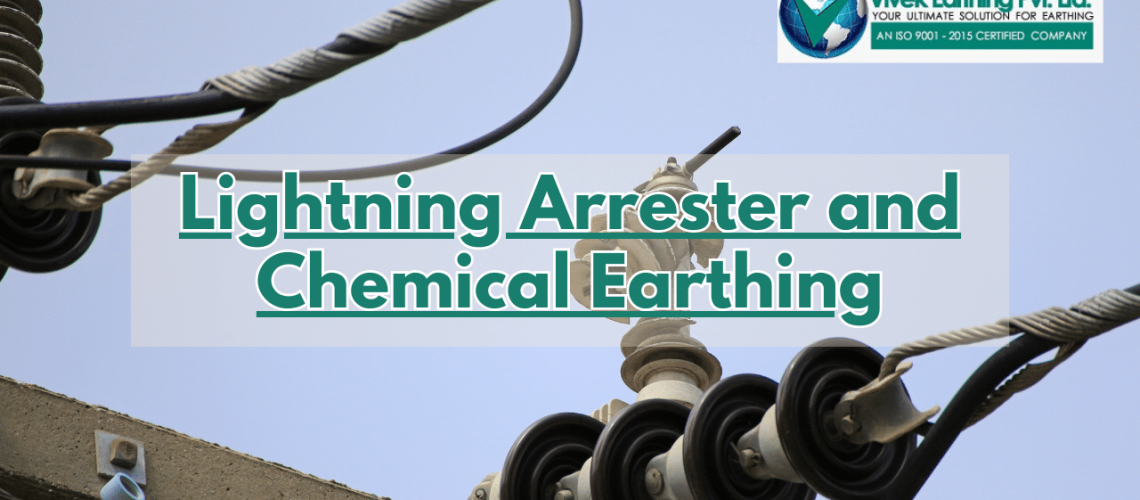Understanding Lightning Arresters and Chemical Earthing: A Comprehensive Guide by Vivek Earthing
Lightning arresters and chemical earthing are crucial components in protecting structures and electronic systems from the potentially devastating effects of lightning strikes and electrical surges. This article delves into the mechanics and importance of these systems, drawing insights from a video by Vivek Earthing on the subject.
What is a Lightning Arrester?
A lightning arrester, also known as a surge protector, is a device installed in electrical systems to protect the insulation and conductors of the system from the damaging effects of lightning. The basic idea is to provide a low-resistance path for the lightning surge to lessen the amount of electricity that flows into the infrastructure.
The Importance of Lightning Arresters
- Prevention of Fire Hazards: When lightning strikes a structure without a lightning arrester, it can ignite a fire. The arrester diverts the surge, minimizing this risk.
- Protection of Electrical Appliances: Lightning strikes can cause power surges that damage electronic devices. Arresters prevent these surges from reaching sensitive equipment.
- Safety for Individuals: By controlling the unpredictable and high voltage of lightning, arresters contribute significantly to the safety of individuals in the vicinity of the protected structure.
What is Chemical Earthing?
Chemical earthing, also known as a grounding system, is a safety measure used in electrical installations. This system provides a path for fault currents, lightning, and electromagnetic waves to flow directly into the earth, thereby preventing any undesired consequences.
The Role of Chemical Earthing
Stabilizing Voltage Levels: It helps in maintaining a stable voltage level in electrical installations.
Protecting Against Electric Shock: In case of any fault in the electrical system, chemical earthing provides a safe path for the fault current, significantly reducing the risk of electric shock.
Enhancing the Life of Appliances: By preventing voltage spikes and surges, it contributes to the longevity of electrical appliances.
Vivek Earthing’s Approach
Vivek Earthing specializes in providing high-quality lightning arresters and chemical earthing solutions. Their products are designed to offer maximum safety and efficiency.
Range of Products: They offer a variety of lightning arresters and grounding systems suitable for different applications, including residential, commercial, and industrial setups.
Quality Assurance: Their products are made with high-quality materials, ensuring durability and reliability.
Customization: Vivek Earthing provides solutions tailored to the specific requirements of its clients.
Applications of Lightning Arresters and Chemical Earthing
Residential Buildings: To protect homes from lightning damage and electrical surges.
Commercial Establishments: Essential in protecting office buildings, shopping centers, and other commercial properties.
Industrial Plants: Crucial for safeguarding industrial machinery and workers from electrical hazards.
Telecommunication Towers: To prevent damage to sensitive telecommunication equipment.
Power Generation and Distribution Systems: Integral in protecting the power infrastructure.
Conclusion
Lightning arresters and chemical earthing systems are indispensable in modern electrical installations. They provide essential protection against lightning strikes and electrical surges, thereby ensuring the safety of structures, electronic equipment, and individuals. Vivek Earthing, with its extensive range of products and commitment to quality, stands as a reliable provider of these critical safety solutions.
Understanding and implementing these systems can be complex, but with expert guidance and quality products from providers like Vivek Earthing, one can ensure maximum protection and safety. The integration of these systems is not just a technical requirement but a necessary step towards safeguarding our modern, electrified world.
FAQs
1. What is a Lightning Arrester and How Does it Work?
Ans. A lightning arrester is a device installed in electrical systems to protect them from the damaging effects of lightning strikes. It works by providing a low-resistance path for the electrical surge caused by lightning, directing it safely into the ground and away from the protected structure or electrical network.
2. Why is Chemical Earthing Important?
Ans. Chemical earthing, also known as grounding, is crucial for safety in electrical installations. It provides a safe path for fault currents and lightning to flow directly into the earth. This not only stabilizes voltage levels but also protects against electric shocks and enhances the lifespan of electrical appliances.
3. Can Lightning Arresters and Chemical Earthing Systems be Used in Residential Areas?
Ans. Yes, both lightning arresters and chemical earthing systems are highly recommended for residential areas. They play a crucial role in protecting homes from electrical surges due to lightning, thereby safeguarding electronic appliances, preventing fire hazards, and ensuring the safety of residents.
4. What Types of Buildings or Structures Require Lightning Arresters?
Ans. Lightning arresters are essential for a wide range of structures, including residential buildings, commercial establishments, industrial plants, telecommunication towers, and power generation and distribution systems. Essentially, any structure with an electrical installation can benefit from the protection provided by a lightning arrester.
5. How Often Should Lightning Arresters and Chemical Earthing Systems be Inspected or Maintained?
Ans. The maintenance frequency can vary based on the environment and usage. However, it is generally recommended to inspect these systems at least once a year. Regular maintenance ensures they are in good working condition and capable of providing effective protection against lightning and electrical surges. For specific maintenance schedules and practices, it’s best to consult with a professional or the system provider.


